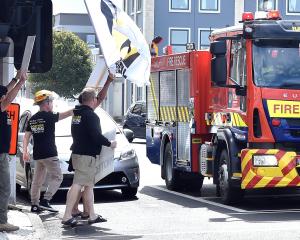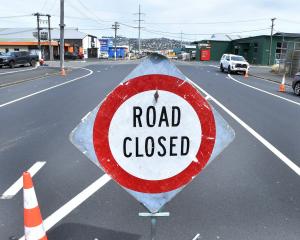A Port Chalmers resident says rivers he swam in as a child are too polluted for his grandchildren to swim in and has called on the Government to put aside cost concerns and clean up New Zealand's waters.
David Blair (69) was one of about 20 people at a public meeting in Dunedin yesterday addressing freshwater reform proposals.
The meeting, at the Kokiri Centre, involved a presentation on the proposals by Ministry for the Environment representatives and offered an opportunity for members of the public to provide feedback.
Mr Blair, an environmental contractor and long-time outdoors enthusiast, said he used to swim in, fish and drink from many low-lying rivers in South Otago.
He now knew of no low-lying rivers in the South Island where that was possible, he said.
‘‘Can't we have our goals a bit higher instead of making it about money or costs?'' he asked.
‘‘We need to think more about the economy of the environment, rather than the economy of produce.''
Mr Blair brought to the meeting pictures he took earlier this year of the Hakataramea River, near Kurow, which he said showed the river was too polluted to swim in.
The river contained cyanobacteria, which could be fatal for dogs, plus a build-up of other algae, he said.
‘‘This used to be an urban problem; now it's a rural problem.
‘‘The intensified farming in the last 15 years has really destroyed our rivers.''
Ministry for Primary Industries director of resource policy David Wansbrough told Mr Blair achieving a balance between industry and the environment was a constant battle.
‘‘The country wants water again. We want to drink it.
‘‘We're trying to find that balance.''
The ministry was proposing to allow regions to decide how they maintained the quality of New Zealand's better waters, Mr Wansbrough said.
The Government proposals included maintaining or improving fresh water quality; requiring farmers to ensure stock could not enter streams, rivers, lakes and wetlands; and introducing a consistent method of measuring ecological health or rivers.
The latter would be achieved by making the macroinvertebrate community index (MCI) a mandatory method of monitoring rivers' ecological health.
MCI recorded the number of aquatic insects living in a freshwater ecosystem, with higher numbers indicating a better river condition.
The proposals also included ways to improve the economic use of freshwater.
Those included developing a technical efficiency standard to address overallocation of water and free up water for new users, and requiring councils to apply good management practice in catchments where discharge allowances had been allocated.
The meeting also proposed ways to recognise iwi rights and interests in freshwater policies.
One of those was recognising the Te Mana o te Wai fund as the underpinning platform for community discussions on freshwater values, objectives and limits.
Te Mana o te Wai provided funding for projects supporting iwi and hapu to improve freshwater quality.
Iwi would also be included in decision-making about freshwater in their territories and all marae and papakainga would have access to clean drinking water.
The latter had been a problem in certain areas in New Zealand, notably Gisborne and Auckland.
Ministry director for iwi rights and interests Tania Gerrard said iwi did not believe the proposals had gone far enough in addressing their concerns.
Ministry director of water policy Peter Brunt moved to allay the concerns of one speaker, who was worried by the Government's recently stated stance of having a ‘‘wadeable'' water standard as the nation's bottom line.
Mr Brunt said comments, by Environment Minister Dr Nick Smith had been taken out of context.
‘‘Wadeable was the bottom line for the worst waters.''

!["The reality is that [power prices] will be going up for the next few years" — Meridian Energy...](https://www.odt.co.nz/sites/default/files/styles/odt_landscape_small_related_stories/public/story/2026/02/lisa-hannifin-v2_extrewrit.jpg?itok=MQEzuJAo)









